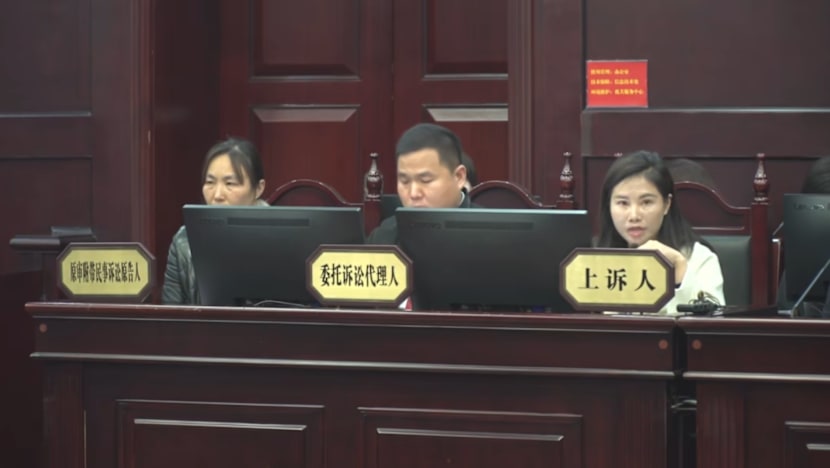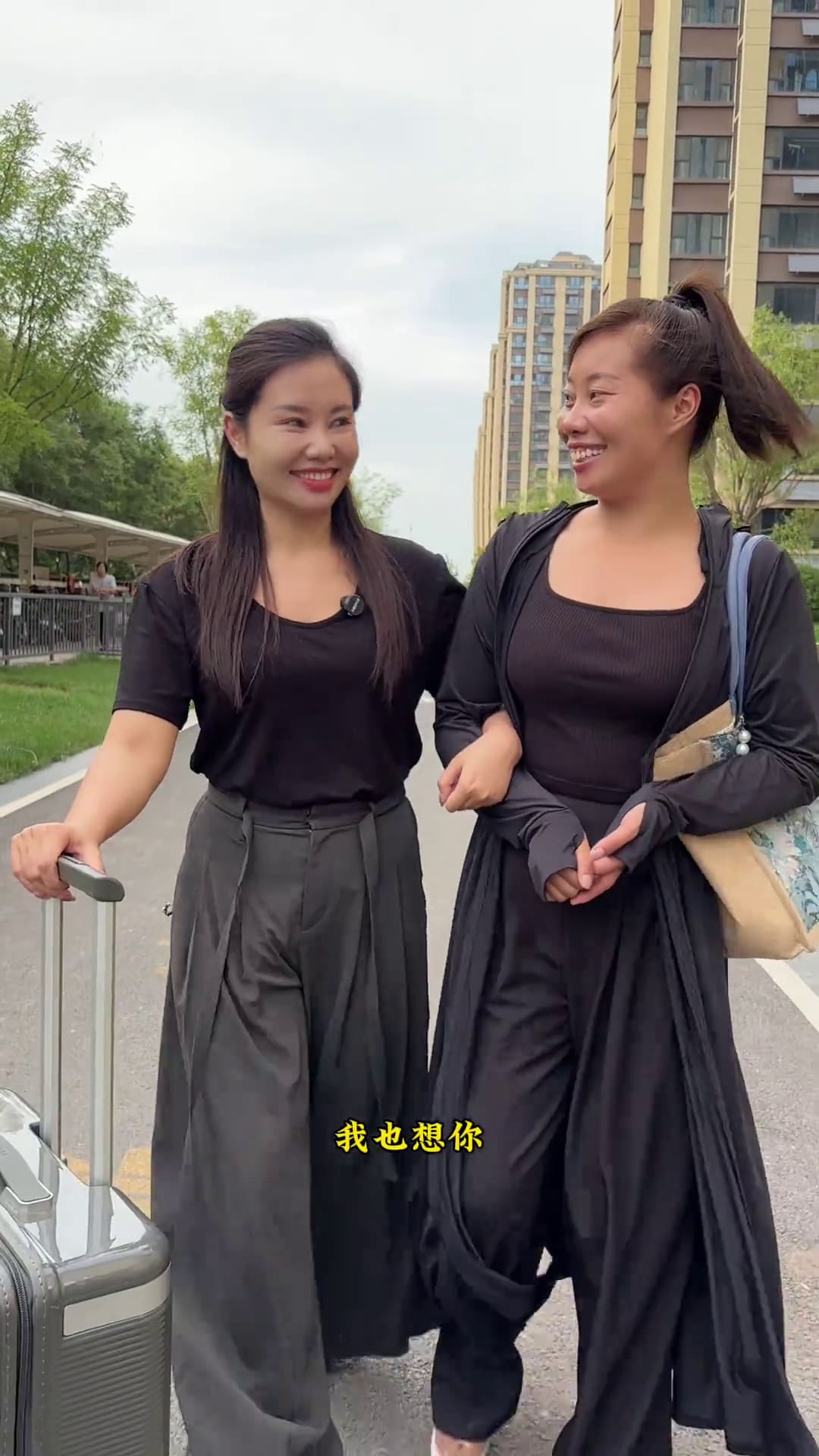'Selling misery': China’s victim-turned-livestreamers turn trauma into traffic and face growing scepticism
In China’s booming livestream economy, personal pain has become a powerful currency. But as sympathy turns into a commodity, empathy itself risks running out.

Xie Qingshuai (left) and Yang Niuhua (right) are some of the child trafficking survivors who have pivoted to livestreaming on popular short video platform Douyin. (Images: Douyin/Xie Qingshuai, yangniuniu2021)

This audio is generated by an AI tool.
SINGAPORE: At first glance, Yang Niuhua seems like any other livestreamer on Douyin - chatting with viewers while promoting various products in real time.
But the 34-year-old’s path to social media fame is anything but conventional.
In 1995, Yang was abducted and sold as a child - a traumatic past she now recounts with millions online. In between product pitches, she reflects on her past as well as the shame she once felt.
“At that moment, I didn’t want to appear in front of anyone, because I felt being a victim of trafficking was embarrassing,” Yang said during a livestream session last November, where she promoted sneakers from a Chinese sportswear brand.
More than 60,000 viewers tuned in that day and sales reportedly reached 10 million yuan (US$1.4 million), according to Chinese media reports.
The broadcast marked another turn in Yang’s life - from a survivor of child trafficking to advocate, and now, a successful Chinese livestreaming personality with an online following of nearly 3 million.
“I hope to (use the livestream to) show everyone my real self, to use my words to move you,” Yang told viewers during the livestream, describing her popularity as built on “everyone’s love and sympathy”.
Comments and reactions flooded the livestream. Some praised Yang’s bravery and perseverance, while others accused her of monetising her past and “trying to become an influencer”.
“What I dislike is cultivating a tragic persona within the community and taking up massive public resources,” Douyin user Kyo wrote, adding that communities are working together to search for missing children across China. “Instead, you’re selling products online.”
“The anger stems from you using your internet traffic to livestream and sell products,” remarked another user Strawberry. “If (you were) promoting anti-trafficking efforts or doing something beneficial for society, reactions would be different.”
“Our focus should be on child trafficking cases,” Strawberry added. “There's no need to pay attention to her.”
Yang is not the only victim-turned-livestreamer to find both opportunity and controversy in this space.
While no official figures exist, similar cases have drawn public attention in recent times, with some former victims of crime and hardship turning to livestreaming as a means of reinvention and, for some, survival.
The practice of livestream hosts sharing their stories or selling products while referencing personal hardship is often described in Chinese as “mai can” - which translates to “selling misery”.
Analysts told CNA that there is a growing “sympathy economy” on Chinese social media, where trauma becomes both content and tool for monetisation.
Many livestreamers have learned to work algorithms that reward emotional engagement, turning moments of empathy into streams of revenue, experts added.
Yet critics warned that as imitation multiplies, viewers grow desensitised - leaving the truly vulnerable struggling to be heard in a marketplace crowded with curated suffering.
“CELEBRITY WHO REUNITES FAMILIES”
Yang was born in a village in southwestern China’s Guizhou province. She was kidnapped by a neighbour when she was five, and later sold to a family in Hebei province, thousands of kilometres up north, for 3,500 yuan.
The case drew national attention in 2021 when Yang came forward and reported her ordeal to Chinese police.
Her abductor Yu Huaying was sentenced to death for trafficking Yang and 16 other children between 1993 and 2003, and was executed at age 61 in February.
Yang managed to reconnect with her biological sister on Douyin, the Chinese version of TikTok, where she actively shares stories of other missing Chinese children under the handle @yangniuniu2021 - while promoting products from food to lifestyle items, clothes and electronics like Bluetooth keyboards and tablets.
Online, Yang has been described as an “internet celebrity who reunites families”.
In an article published last December by Jiupai News, a local outlet in the central Hubei province, she has been described as a symbol of determination and reconciliation - someone able to turn personal tragedy into public advocacy by using her social media following as a platform to raise awareness about missing children cases.
In September, she shared the story of an 82-year-old man who had travelled from Hubei to Hebei province, still searching for the child he lost three decades ago.
Back in June, she shared a video of a 31-year-old woman nicknamed Bo Lie, who recalled being taken from her grandmother and older sister when she was five.
“Being an influencer isn’t my end goal,” Yang told Jiupai News. “I want to do more and become a beacon of hope for those searching for their missing loved ones.”
“I believe that in the future, there will be thousands of Yang Niuhua coming forward and working to bring their traffickers to justice, just like what I did,” she said.


Yang isn’t the only Chinese child trafficking survivor whose growing online presence has drawn both admiration and criticism.
Xie Qingshuai, abducted as a baby in 1999 and later reunited with his birth family, has also faced negative comments on his Douyin videos from viewers accusing him of using past trauma to gain internet traffic and profit.
One Douyin user, known as Johnny in Ireland, shared his take in a video criticising the “missing-loved-ones community”.
He said some livestreamers have “turned the community of those wishing to reunite with their families into a complete mess”.
“Do you know who the biggest victims are in this? It’s the parents who have yet to locate their child - they’re the ones who need society’s help,” he said.
People are also now less willing to support trafficking victims online and sarcastic and negative comments have become more common, he added.
THE BUSINESS OF EMPATHY
The “selling misery” phenomenon isn't just limited to child trafficking victims or those searching for missing family members. It also includes bloggers who claim to face misfortunes from major illnesses and business failures to unhappy marriages - turning their pain into content.
Li Yang, an associate professor and dean at the Cheung Kong Graduate School of Business (CKGSB) in Beijing, said the phenomenon is hardly new.
“It’s a very common societal phenomenon that leverages on people’s sympathy,” Li told CNA, comparing it to "begging on the streets" and “charity programmes on TV”.
“Some people are genuinely struggling - that’s undeniable but there are those who exaggerate or even fabricate their hardships,” he added.
“For viewers, it’s a combination of virtue-signalling consumption and entertainment,” said Ashley Dudarenok, founder of Chinese marketing and research firm ChoZan.
“They aren’t just donating - they’re purchasing a narrative of resilience and participating in a real-life drama,” she added.
“For the hosts, it’s a way to monetise their trauma - transforming past vulnerability into present-day social capital. This creates a transactional empathy where support is tied to a continuous performance of suffering and recovery.”
Li noted that stories about family separation and reunion are among the most powerful in attracting attention online.
“The search for missing family members is universally compelling,” he said.
“These personal stories tend to draw far more viewers than other hardship narratives, such as living with disabilities or recovering from serious injuries.”
Social media, he added, has “amplified the scale and reach” of such content, allowing emotional stories to “spread faster and wider than ever before”.
“Someone sharing their experience of being trafficked can forge a close and interactive relationship with the audience,” Li said.
“It makes viewers feel as if the host is a friend - and helping friends out feels natural. In some ways, it becomes a form of redemption,” he added.


Samuel Kwok, a Suzhou-based professor at Xi’an Jiaotong-Liverpool University, questioned the sustainability of using personal hardship to drive sales.
Such tactics may attract sympathy purchases but offer little lasting value if the product itself fails to connect with consumers. The trend, he added, often inspires imitation, with similar stories quickly multiplying before audiences lose interest.
“The tactic is effective, and overnight many similar stories will appear,” he added.
“But people eventually get tired of such approaches.”
Dudarenok described this fatigue as a “compassion saturation effect”.
While such content can initially draw attention to overlooked issues, it eventually risks commodifying hardship as more people monetise their trauma, she said.
Over time, “the public’s attention becomes a finite resource”, she said.
“The most dramatic or strategically packaged stories win - often drowning out genuine awareness campaigns that lack the same production value or emotional punch.”
WHEN PUBLIC SYMPATHY IS EXPLOITED
Despite the emotional appeal of such livestreams, public trust could be at risk if hosts were found to have fabricated or exaggerated their stories, experts said.
In November last year, an investigative report by Chinese state broadcaster CCTV revealed that an internet personality known as Xiao Xiao had faked her tragic backstory to attract sympathy and boost sales through e-commerce livestreams.
According to police in Shenyang, capital of the northeastern Liaoning province, Xiao claimed she had been abandoned by her biological parents and raised by her adoptive mother and grandmother.
Her grandmother had died from illness, she said, along with her older sister who perished in a fire.
She further alleged that her mother suffered a mental breakdown after the tragedy, while her adoptive father took away compensation money and refused to support them.
Xiao's “tragic” life story did not end there. She also claimed her mother had been injured in a car accident, and despite filing a police report, the case remained unsolved.
But authorities later found that none of the incidents she described had ever taken place - with police investigations revealing that Xiao had fabricated several stories and filed false reports.
She was arrested last September over making multiple fake reports.
Such incidents reveal how “selling misery” can invite both imitation and deception, said Kwok.
When online audiences discover that personal hardship stories are fabricated, they often feel betrayed and withdraw their support, he added.
“If people discover the story isn’t real, they become angry and stop (believing),” he said.
Li warned that this erosion of trust would have broader social consequences.
“When these phenomena become too pervasive, it’s easy to erode trust in society,” he said.
Online audiences are also showing signs of fatigue as content “selling misery” becomes more common, he said.
“Stories about searching for missing loved ones are now everywhere,” he said.
“The public becomes desensitised - what was once tragic no longer feels as tragic.”
He also noted that authenticity remains a growing concern.
“It’s not possible to verify the truth behind every claim but if some people go overboard - whether by soliciting donations or livestreaming goods - it can easily cross a line.”
CRACKDOWN ON “SELLING MISERY”
Chinese regulators have also stepped up efforts to police the industry.
Late last month, the Cyberspace Administration of China (CAC) launched a two-month campaign to tighten oversight of livestream tipping and crack down on deceptive online practices such as staged hardship and abuse.
In a separate investigation published in September by China Consumer Journal, a publication under the State Administration for Market Regulation, authorities warned that “unscrupulous individuals” were using personal tragedies to attract sympathy and drive internet traffic.
The report said some multi-channel network agencies had travelled to rural areas to recruit elderly people facing economic hardship.
Under the guise of “helping them escape poverty”, the agencies signed cooperation agreements and crafted exaggerated or fabricated “tragic personas” to boost online sales.
Despite the debate, Yang - the abductee-turned-livestreamer - has spoken out against the anger directed at her.
“I don’t know where the anger is coming from,” she said in one broadcast.
“Did I snatch up people’s businesses? Is it because I don’t carry enough ‘positive energy’? Or is it because people once felt sorry for me, but now that I’ve learnt to stand up for myself, they feel the need to put me down?”
She continues to appear regularly on Douyin, even responding to critics with defiance.
“You’ll end up becoming die-hard fans,” she quipped during a recent livestream.
While some question her motives, others have defended Yang.
“People need to buy things, and they can choose to buy from whoever they want,” Douyin user Xiaoyumi wrote in defence of Yang during a livestream session.
Another user with the handle Jing argued that Yang’s turn to livestreaming was born out of circumstance, not ambition.
“If it wasn’t for (her abductor) Yu Huaying, Yang could have studied at a top university, become a researcher or a doctor,” she wrote.
“She wouldn’t need to go through such hardships or face scrutiny while livestreaming.”
The debate over the ”sympathy economy“ reveals how compassion itself has become a resource to be managed.
“Public sympathy is a finite resource - and overexploiting it inevitably has consequences,” said Li.




















